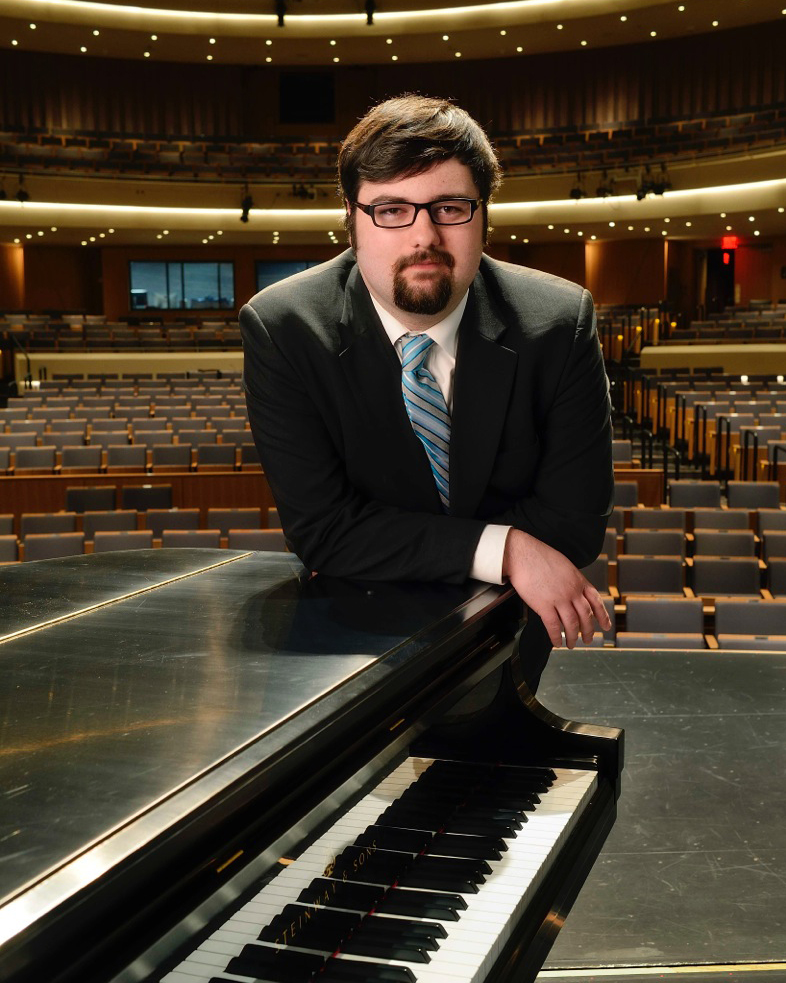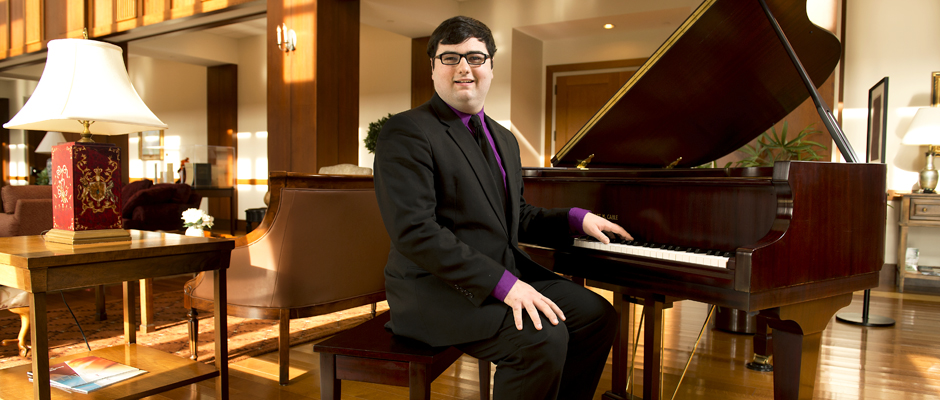Student virtuoso to perform music from global competition at senior recital

Already known internationally for his gifts as a pianist, Virginia Tech student Travis Whaley can add bilingual researcher to his list of talents.
His senior recital falls in the “not to be missed” category.
The recital will be held on Saturday, Oct. 25 at 4 p.m. in the Squires Recital Salon, which is located in the Squires Student Center at 290 College Ave.
One of 45 pianists selected to compete in the International Johann Sebastian Bach competition this past summer in Leipzig, Germany, Whaley played for some of the world’s leading Bach interpreters. He deemed the 10-day prestigious event as initially “very stressful, but after a few days the tensions eased up.”
His competitors represented 28 countries and ranged in age from 18 to 35. Whaley, the fourth youngest at 20 years, marveled at the diversity of styles that “were very different from mine.”
The competition is held every four years, so while Whaley did not take home a prize, he certainly gained valuable experience, including private sessions with one of the judges where even the speed of a trill is evaluated.
The senior from Cary, North Carolina, is making the most of the Virginia Tech experience, triple majoring in piano performance, music composition, and German language and literature, all in the College of Liberal Arts and Human Sciences.
“The baroque, classical, and early Romantic periods in music all happened in German-speaking countries,” explained Whaley, “and I wanted to understand the people and the culture around it.”
So Whaley practiced his German by diving into Honors research the remainder of his six weeks abroad as he studied the letters and sketchbooks of Ludwig van Beethoven in the Beethoven-Archiv, part of the Beethoven-Haus in Bonn.
“It was cool to read his actual words,” said Whaley. “It’s how we get in his head in trying to understand what he was thinking at the time a piece was being composed.”
A fan of the Romantic period, Whaley said that Beethoven “was known to almost always carry a sketchbook with him.” In Whaley’s blog, called Salty Pitches, he talks about reviewing “melodies Beethoven jotted down but then never used.” Whaley says the composer would meticulously sketch and rework the same measure 15 times and then, perhaps, re-do it all again.
Whaley is writing two versions of his Honors thesis, one in English for his music degree and the other in German to fulfill requirements for the German major. He has an outline of the entire project and currently is drafting the first section of the first chapter. The focus is Beethoven’s piano sonata Op. 53 in C Major, the “Waldstein,” written in 1804 during the composer’s middle period.
Whaley’s goal is to reconstruct the compositional process by examining Beethoven’s letters as well as his sketchbooks. Significant as well is the historical context: The piano was still evolving at this time, and Beethoven had just received a more modern version of the instrument as a gift before composing the sonata. As a result, this sonata is the first to use the expanded range that the larger keyboard afforded.
Professor of German Debra Stoudt, Whaley’s faculty advisor for this project, points out how remarkable it is for an undergraduate to conduct research of this kind. She notes: “It is very unusual for an undergraduate to have the German language, musical, and research skills to pursue original scholarship and to engage in archival work with primary materials. The warm reception Travis received this summer at the Beethoven-Archiv attests to his abilities.”
Whaley also enjoyed the Salzburg Festival of music and drama in Austria, the birthplace of Wolfgang Amadeus Mozart. Whaley noted, with some sadness, that Mozart left no sketchbooks: “He composed out of this head.”
Whaley uses sketchbooks but can also compose without one. While touring Italy as a member of the Virginia Tech Chamber Singers in the summer of 2012, Whaley was surprised by Dwight Bigler, director of the chamber singers, with an opportunity to play the postlude at a Mass at the Vatican.
“Dr. Bigler turned to me and asked, ‘Do you have anything ready?’ ” Whaley recalled. “I told him that I wrote a piece on the plane on the way over. So I spent the rest of the Mass sitting there making sure I remembered it because I didn’t have any music with me.”
Whaley says he will play selections from Bach (including one from the competition), Mendelsohn, and Shostakovich at his recital along with “some fun Spanish music.”
Whaley also serves as organist at a local church, so if the recital date doesn’t work out in the schedule, try a Sunday morning in a pew at Blacksburg United Methodist Church.
Gary Cope contributed to this article.





